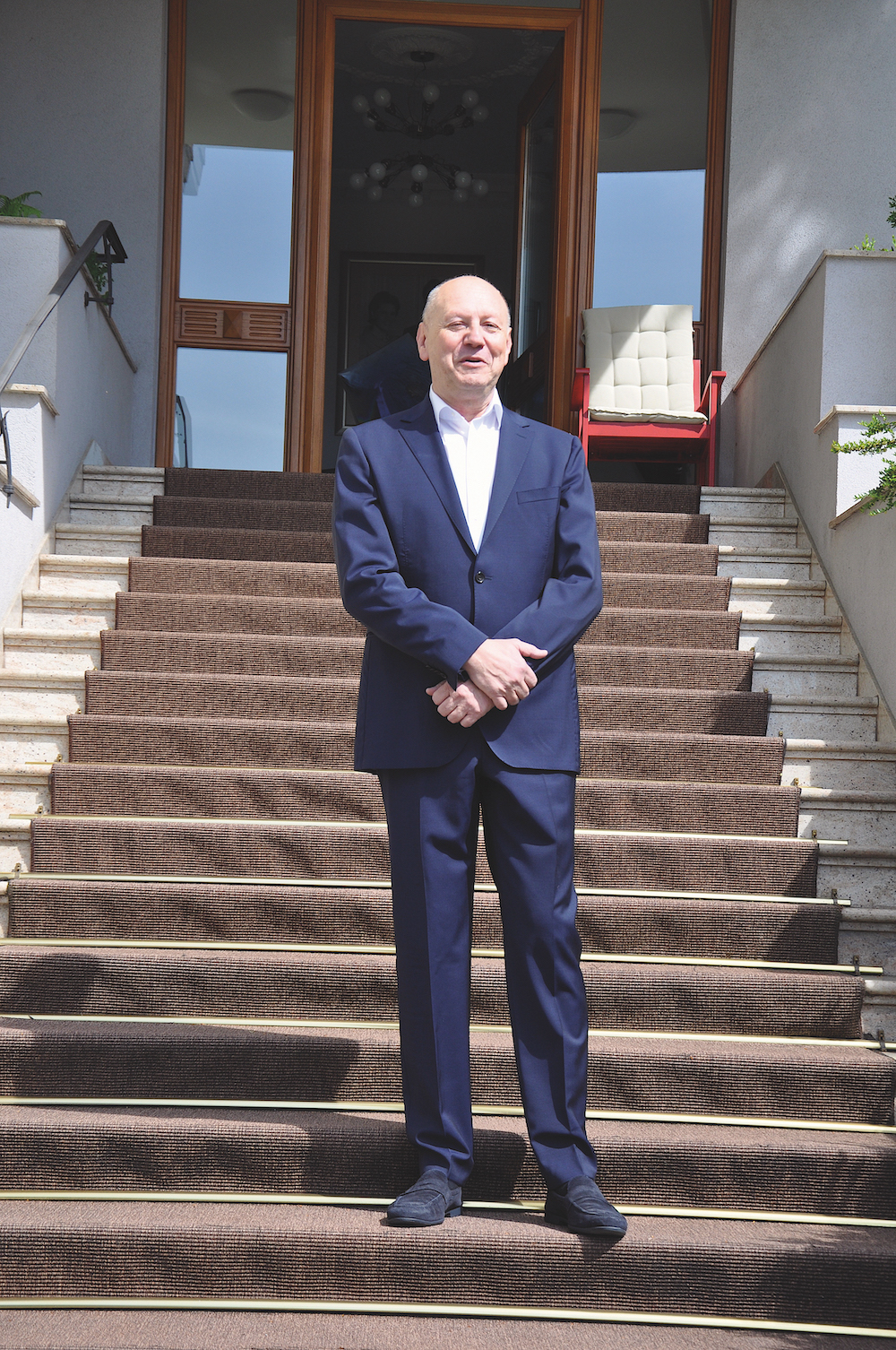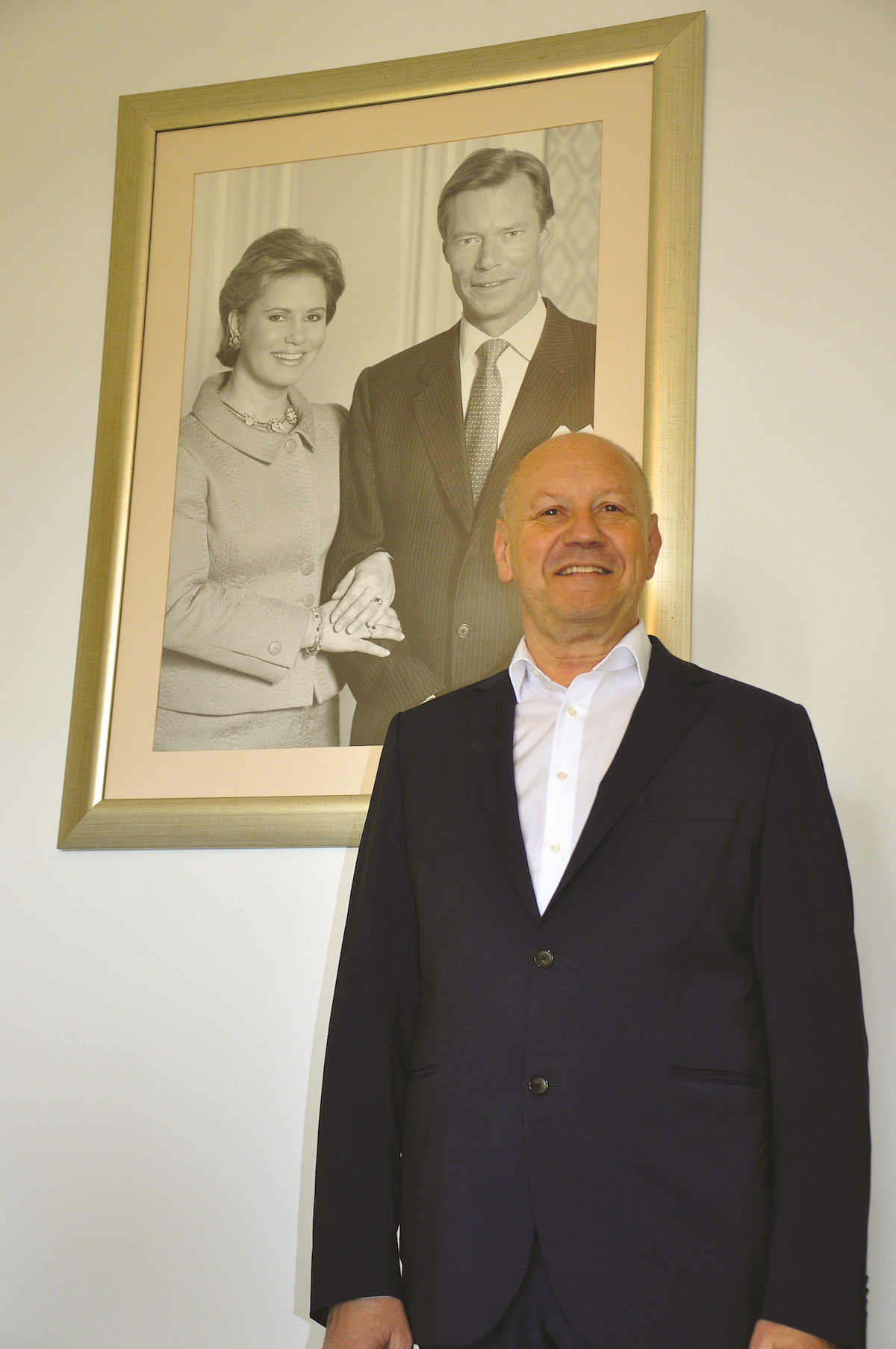“There is a ‘mental Charles Bridge’ between our two nations”

H.E. Ronald Dofing, Ambassador of Luxembourg
Text: Martina Hošková and M. Zisso; Photo: archive
Serving in Prague these days while also being co-accredited to Ukraine makes not only Ambassador Mr. Ronald Dofing, but the entire Luxembourg Embassy, even busier than usual. Fortunately, he found the time to discuss his life-long diplomatic career experience and opinions with us. His first visit to Prague dates to 1982, and since then he has discovered many similarities between our two European nations. The bilateral relations are traditionally excellent, so which areas would he like to expand even further?
Can you tell us about your professional career?
Most of my professional career has been spent inside the diplomatic corps of Luxembourg, which I joined some 30 years ago, after my studies at the Sorbonne in Paris and the European University Institute in Florence. It was the unique historical moment when the Berlin Wall fell and the Cold War antagonism came to an end, opening up new perspectives for diplomacy and beyond.
Which countries have you been appointed to so far?
A fair share of my initial career was spent in Brussels, working with the European institutions.
As a temporary member of the European Council Secretariat, I was able to particularly witness the strengthening of ties between the European Union and Asia and the setting up of ASEM. Back at the Luxembourg Permanent Representation, I was closely engaged in the process of the enlargement of the EU to the Central and Eastern European States, culminating in the 2004 and 2007 accessions.
In 2005, I was appointed first resident ambassador of Luxembourg to Poland, setting up the Grand- Duchy’s embassy in Warsaw, with its co-accreditations to Latvia and Lithuania. My second ambassadorial posting then was in Athens from 2010 onwards, before returning to headquarters at the Ministry of Foreign Affairs in Luxembourg, where I served as a thematic ambassador for international migration, as well as non-resident ambassador to Bulgaria. Finally, I was appointed head of our mission in the Czech Republic in 2021, being also co-accredited to Estonia and Ukraine.
Do you remember your first post-arrival impressions of Prague?
I was not a complete newcomer to the Czech Republic, since I had visited Prague and other cities and regions on private trips well before my official appointment. My first visit actually goes back as far as 1982, when I came to Prague as a student. The historical and cultural wealth of the Czech Republic has always drawn me to the Bohemian and Moravian lands, to a measure that I can sincerely say that I knew the country quite well already before arriving here in my official capacity.
As a film lover, the works of the Czech New Wave of the 1960s have always featured highly in my personal cinematographic pantheon (especially Jan Němec, Věra Chytilová and the early films by Miloš Forman). The same applies to the brilliant writers of the 20th century in Czechoslovakia.
It seems that you have a lot more to share regarding Czech culture from the perspective of a Luxembourger…
Of course, there are the secular historical and cultural ties between Luxembourg and Prague, harking back to the dynastic Luxembourgish rulers of Bohemia in the Middle Ages, and in particular the “builder king” Charles IV. In this regard, it is striking – and it has been mentioned by many of my Czech friends – how actually similar the landscape of our two countries is, dotted by numerous castles, with its green valleys and lush farmlands and vineyards. One can safely say that there is a “mental Charles Bridge” between our two nations, which explains how easily we have re-established ties after the decennia of forced separation during the Cold War.
Czechs and Luxembourgers share a basic tendency to address issues in a calm, dispassionate, and consensual way. This was probably brought about by their insular and landlocked situation in the centre of Europe, and by their similar experiences of successive foreign rule over the centuries. This has also strengthened their respective national identities, at the same time making them acutely aware of the necessity for good-neighbourly relations and international cooperation.
Is this “mental Charles Bridge” reflected in the current state of diplomatic relations between the two countries?
Last year, we commemorated 100 years of the establishment of formal diplomatic relations between our two countries. I can only underline that our bilateral relations, which have traditionally been excellent – I would challenge anyone to give me an example to the contrary! – are currently at a peak, with a very large convergence on European and international issues, and a constantly strengthened cooperation on those topics.
I am looking forward to expanding our relations in the space sector, and also in the support of the Green Economy, including the finance sector. Luxembourg has taken a lead in the promotion of Green Bonds, a crucial issue at a time of energy diversification and the combating of climate change. Coming from a small former mining town in the South of Luxembourg myself, I admire the transformation of the steel plants in Ostrava: here, too, the best practices for setting up research centres for new technologies can be shared.

H.E. Ronald Dofing, Ambassador of Luxembourg
Where exactly do you see the role of the Luxembourg Embassy in strengthening our mutual ties within Europe?
As one of the founding members of the European Union, Luxembourg is constantly striving to spread the message of solidarity and integration, based on the rule of law and respect of civic and individual rights. European integration is in the DNA of most Luxembourgers, and the Czech Republic is a natural ally in this endeavour. The role of the Embassy in Prague is therefore to strengthen our ties on all levels of a “citizen’s Europe”, apart from the more traditional duties of economic and political networking.
In 2020, Luxembourg public transportation was made free of charge. What has this experiment shown so far?
Promoting soft mobility has been at the core of the decision of Luxembourg in 2020 to make public transportation free of charge. It has been the first country in the world to do so, and the success has been resounding. Three years on, the formula is proving very attractive to the users of public transport, among them many commuters from France, Belgium, and Germany, who travel to Luxembourg on a daily basis for work.
Tourists also appreciate the extensive tram, bus, and railway network, which allows them to visit the country hassle-free. Among them, more and more tourists from Czechia. In this context, the direct Luxair flights between our two capitals are a bonus – they have also increased the numbers of visitors from Luxembourg in Prague, who often, after their first trip, come back to explore the Czech Republic at large. To support this growing demand, our embassy has expanded its cultural reach-out programs, organizing events of mutual interest, for example the recent exhibition of the painter Guido Oppenheim at the Terezin Ghetto Museum, and the performance by the Luxembourg collective Hani Dance at DivadloX10.
How do you spend your free time in Czechia?
As you can imagine, the co-accreditation to Kyiv takes up a considerable amount of time for all of my collaborators. Leisure time is precious and helps to de-compress. My husband and I are fans of Czech folklore – one of the richest in Europe – and we really enjoyed a Masopust in Roztoky earlier this year. We are also regulars at the Spejbl and Hurvinek Puppet Theatre in Dejvice (the language barrier is no problem here…), and at any Josef Lada show. Another recent highlight was the backstage meeting with rock legend Suzi Quatro after her concert at Lucerna – there are plentiful occasions to have a great night out in Prague!

